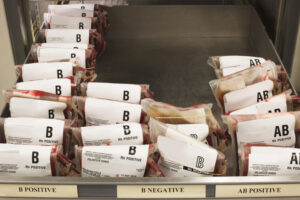The ABO blood group is the most immunogenic group of blood antigens, and incompatible mismatched ABO-blood is among the most common causes of death from a transfusion. The H (histocompatibility) antigen and its subtypes define the O blood group and is the precursor to the A and B blood groups. Different terminal glycans attached to the H antigen on the surface of the RBCs, endothelial cells, and mucin define the ABO blood group and the different subtypes. In 1982, an α-galactosidase was identified that enzymatically cleaved the A and/or B specific terminal glycans converting A and B group RBCs to the universal ABO-group O, but safety concerns and inefficiency around these and other enzymes have prohibited large-scale generation of ABO-universal blood for transfusions. In 2019, several additional exoglycosidases were identified from a gut microbiota library. Researchers have now identified a cocktail of enzymes from the gut microbe Akkermansia muciniphila, which efficiently cleave all the A and B specific glycans, including all known subtypes. After enzymatic removal of the B antigens and subtypes, RBC incompatibility with 100 O plasma samples was less than 9%, and the remaining positive reactions were milder. Structural analysis of the enzymes revealed that the active sites are positively charged, which may guide the engineering of more efficient enzymes to improve the safety and feasibility of generating ABO-universal blood, as this would reduce blood shortages and eliminate the risk of ABO-mismatched transfusion events.
Reference:

